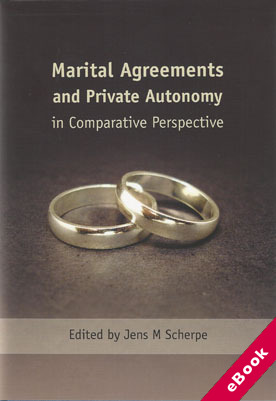
The device(s) you use to access the eBook content must be authorized with an Adobe ID before you download the product otherwise it will fail to register correctly.
For further information see https://www.wildy.com/ebook-formats
Once the order is confirmed an automated e-mail will be sent to you to allow you to download the eBook.
All eBooks are supplied firm sale and cannot be returned. If you believe there is a fault with your eBook then contact us on ebooks@wildy.com and we will help in resolving the issue. This does not affect your statutory rights.
This book deals with a subject that has recently been the focus of debate and law reform in many jurisdictions: how much scope should spouses have to conclude agreements concerning their financial affairs – and under which circumstances should such agreements be binding and enforceable? These marital agreements include pre-nuptial, post-nuptial and separation agreements.
The book is the result of a British Academy-funded research project which investigated and compared the relevant law of England and Wales, Australia, Austria, Belgium, France, Germany, Ireland, the Netherlands, New Zealand, Scotland, Singapore, Spain, Sweden and the jurisdictions of the United States.
In addition to these comparative law chapters the book includes a chapter on the 'English practitioner's view', an overview of the European private international law rules applicable to marital agreements, and a comparative analysis. In the last of these, underlying themes and principles are explored, and recommendations for regulating marital agreements made.
To determine the function and effect of marital agreements each chapter first sets out the underlying 'default' rules for ancillary relief/matrimonial property and maintenance, before analysing the current rules for marital agreements, together with a brief account of the private international law rules in each jurisdiction.
The book provides a comprehensive source of reference on ancillary relief/matrimonial property and maintenance and the rules on pre-nuptial, post-nuptial and separation agreements in 14 jurisdictions. It offers guidance for academics and practitioners dealing with international matters and a basis for discussions on law reform.